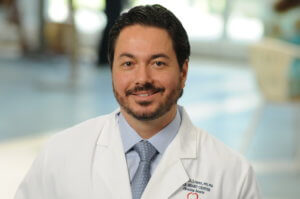Through new ways of working and collaborations across Duke, the DCRI’s Clinical Events Classification group is continuously improving on its processes.
The DCRI’s Clinical Events Classification (CEC) group led the clinical endpoint adjudication for late-breaking clinical trials that are being presented at the American Heart Association Scientific Sessions 2020—and along the way, the group introduced innovations and efficiencies to the typical adjudication process.
Defining Heart Failure Events
DCRI’s CEC group adjudicated over 11,000 clinical events for the heart failure trial GALACTIC-HF. The endpoint adjudication effort was co-chaired by Renato Lopes, MD, PhD, the faculty director for DCRI’s CEC group, and DCRI’s Michael Felker, MD, who was also a member of the study executive committee. Prior to 2016, when this trial began, there were broad definitions for what determined a heart failure hospitalization—which meant that if a person didn’t stay overnight in the hospital, their event might not be counted in final trial data. In a pioneering effort to count events at a more granular and specific level, the DCRI CEC group introduced new definitions for noteworthy events, ushering in “urgent visits” in addition to heart failure hospitalizations.

“This really set the stage for how individual committees analyzed heart failure,” said Matt Wilson, RN, director of operations for DCRI’s CEC-Safety Surveillance group. “It allowed for more precision in how we find efficacy and benefit for heart failure medications that are being tested in clinical trials.”
Creating a One-Stop Shop
For the SOLOIST and SCORED trials, which were part of the same program and presented as a late-breaking clinical trial, the DCRI was able to pull in help from across Duke to offer needed services to the study sponsor.
Typically, groups across the nation that adjudicate clinical endpoints specialize in one clinical area, leaving sponsors with no option but to hire multiple entities to adjudicate all events. The DCRI’s CEC group focused primarily on cardiovascular trials until several years ago, when they began making efforts to expand their offerings to other clinical areas. The majority of the group’s portfolio is now non-cardiovascular—experience that came in handy during this project.
“For this program, we set up three distinct adjudication committees for cardiovascular, renal, and endocrine events,” said Casey Norris, MS, the CEC project leader for these studies. “Our DCRI leaders reached out to their networks of experts across Duke and hand-selected colleagues that could serve as members of the respective committees to help adjudicate these events.”
Lopes was the lead CEC chair of the program, which required adjudication of nearly 2,600 events. He also led the program’s cardiovascular CEC committee.

“Given the broad range of clinical events involved in this trial, it was important to have three separate committees for the adjudication of the different endpoints of this trial,” Lopes said. “We were able to leverage the expertise of faculty in different therapeutic areas across Duke to deliver a high-quality adjudication of cardiovascular, renal, and endocrine endpoints.”
DCRI’s Patrick Pun, MD, MHS, led the renal committee and DCRI’s Jennifer Green, MD, led the endocrine committee.

“We were able to rapidly assemble a team of Duke endocrinologists with expertise in event adjudication, who worked closely together to establish criteria for and review events, including diabetic ketoacidosis and bone fractures,” Green said. “The team was highly motivated to better understand the impact of therapeutic interventions upon these nontraditional but still clinically important outcomes.”
“Adjudicating kidney disease events is often quite difficult due to the inherent shortcomings of kidney disease markers and the paucity of clinical information available,” Pun said. “I’ve appreciated the diversity of expertise of my Duke nephrology colleagues, along with the lively discussions we’ve had as a group to come to a consensus on challenging cases.”

The DCRI’s ability to adjudicate all of the program’s events at the same institution, Wilson said, will be valuable for future clinical trials.
“With the prospect of more treatments becoming useful for a growing number of indications—for example, diabetes medications showing potential benefits in heart failure patients—we’re seeing more trials in which endpoints have multiple therapeutic and clinical areas needing to be captured and measured,” he said. “Because of our extensive therapeutic expertise at the DCRI and our broad network of colleagues across Duke University, the DCRI CEC group will really be able to differentiate itself by acting as a one-stop shop for event adjudication.”